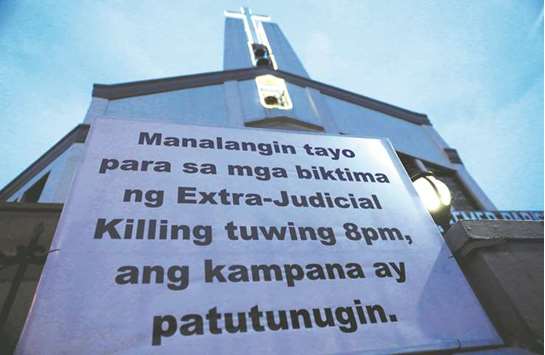A pastoral letter by Catholic Bishops’ Conference of the Philippines (CBCP) sent to priests urged Catholics to pray for victims from today until All Saints’ Day on Nov 1, when Filipinos traditionally pay respects to the dead.
More than 3,800 people have been killed in anti-drugs operations in the past 15 months and at least 2,100 murders are suspected of being drug-related, according to police data, though human rights groups believe the numbers are understated.
“The relentless and bloody campaign against drugs that shows no sign of abating impels us, your bishops, to declare: In the name of God, stop the killings!” Archbishop Socrates Villegas, the head of the CBCP, said in the letter.
Such messages are typically read aloud in church or distributed to their congregations.
Many Catholic churches in the capital have already started lighting candles and ringing bells for five minutes each day at 8pm.
Thousands of Filipinos rallied against Duterte on Thursday to protest against what they fear is an emerging dictatorship, and several churches held mass against the killings and urged people to renounce violence.
The bishops are among the most influential dissenting voices to come out against the Duterte’s uncompromising strategy.
Having been largely silent on the issue when it first erupted last year, priests have increasingly taken a stand against the anti-drugs campaign.
As bodies started to appear nightly in Manila’s slums, the church stepped up its opposition, denouncing the killings and in some cases, providing sanctuary to witnesses of killings and drug users who feared they could be targeted.
Villegas said the country’s bishops were firmly against drugs, but killing was not the solution and prayer was “the most powerful weapon in our arsenal”. Rights groups dispute official police accounts that say drug suspects were killed because they violently resisted arrest.
Critics accuse police of executing users and small-time dealers and planting evidence, which police reject.
Pablo Virgilio David, bishop in Manila’s Caloocan City, where large numbers of drug-related killings have taken place, urged the authorities to end the killings and let healing begin.
“We disagree that we should treat them like monsters to be eliminated like stray cats and dogs,” he said of drug users and criminals.
“We disagree that a criminal has no more hope of changing his life.”

